人教高中英语必修一 Unit 5课本知识点复习
- 格式:docx
- 大小:50.98 KB
- 文档页数:8
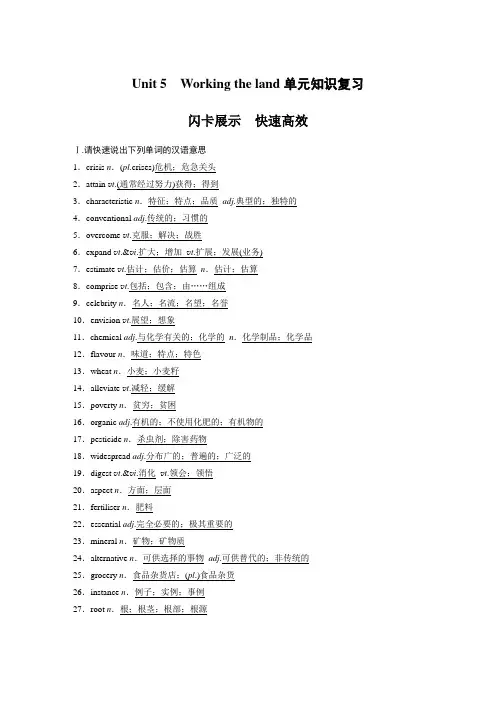
Unit 5Working the land单元知识复习闪卡展示快速高效Ⅰ.请快速说出下列单词的汉语意思1.crisis n.(pl.crises)危机;危急关头2.attain v t.(通常经过努力)获得;得到3.characteristic n.特征;特点;品质adj.典型的;独特的4.conventional adj.传统的;习惯的5.overcome v t.克服;解决;战胜6.expand v t.&v i.扩大;增加v t.扩展;发展(业务)7.estimate v t.估计;估价;估算n.估计;估算8.comprise v t.包括;包含;由……组成9.celebrity n.名人;名流;名望;名誉10.envision v t.展望;想象11.chemical adj.与化学有关的;化学的n.化学制品;化学品12.flavour n.味道;特点;特色13.wheat n.小麦;小麦籽14.alleviate v t.减轻;缓解15.poverty n.贫穷;贫困16.organic adj.有机的;不使用化肥的;有机物的17.pesticide n.杀虫剂;除害药物18.widespread adj.分布广的;普遍的;广泛的19.digest v t.&v i.消化v t.领会;领悟20.aspect n.方面;层面21.fertiliser n.肥料22.essential adj.完全必要的;极其重要的23.mineral n.矿物;矿物质24.alternative n.可供选择的事物adj.可供替代的;非传统的25.grocery n.食品杂货店;(pl.)食品杂货26.instance n.例子;实例;事例27.root n.根;根茎;根部;根源Ⅱ.请快速拼写下列单词1.shortage n.不足;缺少;短缺→short adj.短的2.devote v t.把……献(给);把……专用于;专心于→devoted adj.忠诚的;挚爱的;专心的→devotion n.献身;奉献;忠诚3.assumption n.假定;设定;(责任的)承担;(权利的)获得→assume v.假定;认为;承担4.consumption n.消耗;消耗量;消费→consume v.消耗;消费5.reality n.现实;实际情况;事实→real adj.真的;真实的;现实的6.convince v t.使相信;使确信;说服→convincing adj.令人信服的7.generate v t.产生;引起→generation n.产生;一代人8.extension n.扩建部分;扩大;电话分机→extend v.延伸;扩大;推广9.entirely ad v.全部地;完整地;完全地→entire adj.完整的;完全的10.nutritional adj.营养(物)的→nutritious adj.有营养的;营养丰富的→nutrition n.营养;滋养11.bacterium n.细菌→bacteria n.(pl.)细菌12.depth n.向下(或向里)的距离;深(度)→deep adj.深的;深远的Ⅲ.请快速说出下列短语1.请说出与devote有关的短语(1)devote...to把……奉献给;把……专注于(2)devote oneself to致力于;献身于(3)be devoted to专心于;致力于2. 请说出与convince/convinced有关的短语(1)convince sb.of sth.使某人确信/明白某事(2)convince sb.that...使某人相信……(3)convince sb.to do sth.说服某人做某事(4)be convinced (that)/of...(某人)坚信……3. 请说出与assumption/assume有关的短语(1)on the assumption that...假定……(2)make an assumption作出臆断(3)assume sb./sth.(to be)+adj./n.假定/认为某人/某事(为)……(4)It is assumed that...人们认为……(5)assuming (that)...假设……4. 请说出与expand有关的短语(1)expand...into...把……扩展/发展成……(2)expand into...发展成/扩大成……(3)expand on/upon sth.细说(阐述)某事5. 请说出与use有关的短语(1)in use在使用(2)make use of利用(3)be of (no) use有(没)用(4)come into use开始被使用(5)There is no use in doing sth.做某事没有用。
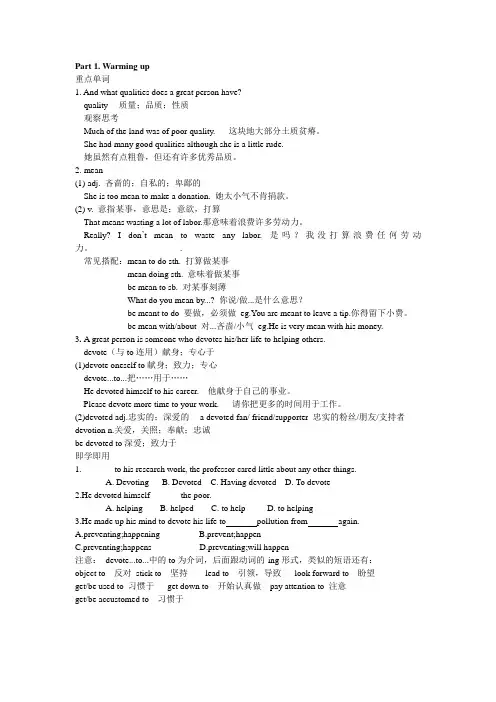
Part 1. Warming up重点单词1. And what qualities does a great person have?quality质量;品质;性质观察思考Much of the land was of poor quality.这块地大部分土质贫瘠。
She had many good qualities although she is a little rude.她虽然有点粗鲁,但还有许多优秀品质。
2.mean(1)adj. 吝啬的;自私的;卑鄙的She is too mean to make a donation. 她太小气不肯捐款。
(2)v. 意指某事,意思是;意欲,打算That means wasting a lot of labor.那意味着浪费许多劳动力。
Really? I don’t mean to waste any labor. 是吗?我没打算浪费任何劳动力。
.常见搭配:mean to do sth. 打算做某事mean doing sth. 意味着做某事be mean to sb. 对某事刻薄What do you mean by...? 你说/做...是什么意思?be meant to do 要做,必须做eg.You are meant to leave a tip.你得留下小费。
be mean with/about 对...吝啬/小气eg.He is very mean with his money.3. A great person is someone who devotes his/her life to helping others.devote(与to连用)献身;专心于(1)devote oneself to献身;致力;专心devote...to...把……用于……He devoted himself to his career.他献身于自己的事业。
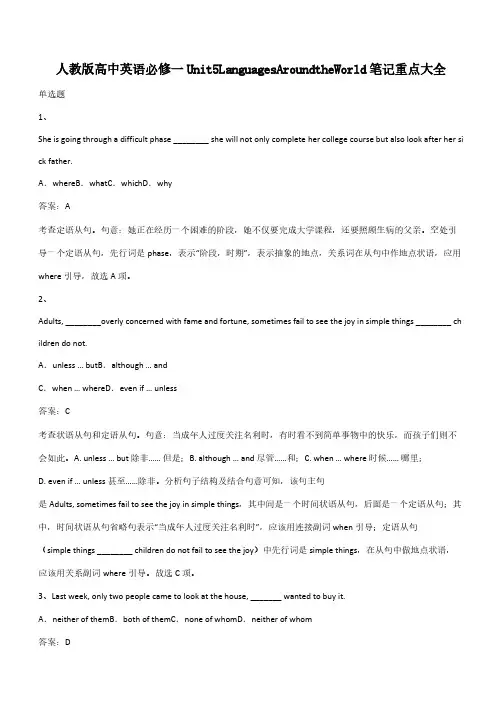
人教版高中英语必修一Unit5LanguagesAroundtheWorld笔记重点大全单选题1、She is going through a difficult phase ________ she will not only complete her college course but also look after her si ck father.A.whereB.whatC.whichD.why答案:A考查定语从句。
句意:她正在经历一个困难的阶段,她不仅要完成大学课程,还要照顾生病的父亲。
空处引导一个定语从句,先行词是phase,表示“阶段,时期”,表示抽象的地点,关系词在从句中作地点状语,应用where引导,故选A项。
2、Adults, ________overly concerned with fame and fortune, sometimes fail to see the joy in simple things ________ ch ildren do not.A.unless … butB.although … andC.when … whereD.even if … unless答案:C考查状语从句和定语从句。
句意:当成年人过度关注名利时,有时看不到简单事物中的快乐,而孩子们则不会如此。
A. unless … but 除非……但是;B. although … and 尽管……和;C. when … where 时候……哪里;D. even if … unless甚至……除非。
分析句子结构及结合句意可知,该句主句是 Adults, sometimes fail to see the joy in simple things,其中间是一个时间状语从句,后面是一个定语从句;其中,时间状语从句省略句表示“当成年人过度关注名利时”,应该用连接副词when引导;定语从句(simple things ________ children do not fail to see the joy)中先行词是simple things,在从句中做地点状语,应该用关系副词where引导。
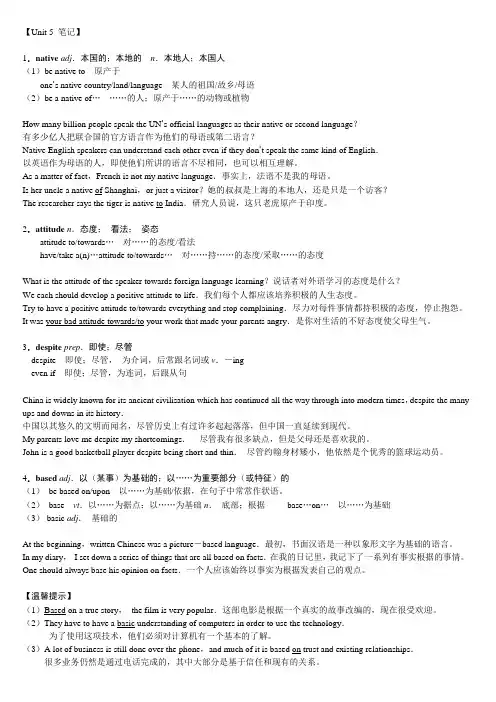
【Unit 5 笔记】1.native adj.本国的;本地的n.本地人;本国人(1)be native to原产于one's native country/land/language某人的祖国/故乡/母语(2)be a native of………的人;原产于……的动物或植物How many billion people speak the UN's official languages as their native or second language?有多少亿人把联合国的官方语言作为他们的母语或第二语言?Native English speakers can understand each other even if they don't speak the same kind of English.以英语作为母语的人,即使他们所讲的语言不尽相同,也可以相互理解。
As a matter of fact,French is not my native language.事实上,法语不是我的母语。
Is her uncle a native of Shanghai,or just a visitor?她的叔叔是上海的本地人,还是只是一个访客?The researcher says the tiger is native to India.研究人员说,这只老虎原产于印度。
2.attitude n.态度;看法;姿态attitude to/towards…对……的态度/看法have/take a(n)…attitude to/towards…对……持……的态度/采取……的态度What is the attitude of the speaker towards foreign language learning?说话者对外语学习的态度是什么?We each should develop a positive attitude to life.我们每个人都应该培养积极的人生态度。
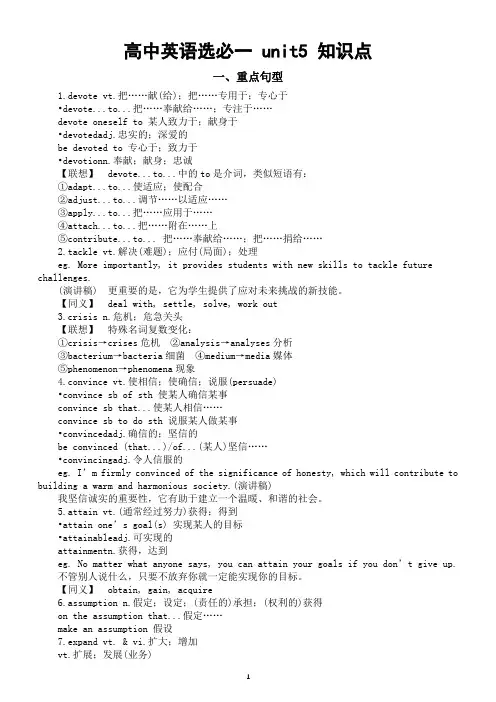
高中英语选必一 unit5 知识点一、重点句型1.devote vt.把……献(给);把……专用于;专心于•devote...to...把……奉献给……;专注于……devote oneself to 某人致力于;献身于•devotedadj.忠实的;深爱的be devoted to 专心于;致力于•devotionn.奉献;献身;忠诚【联想】devote...to...中的to是介词,类似短语有:①adapt...to...使适应;使配合②adjust...to...调节……以适应……③apply...to...把……应用于……④attach...to...把……附在……上⑤contribute...to... 把……奉献给……;把……捐给……2.tackle vt.解决(难题);应付(局面);处理eg. More importantly, it provides students with new skills to tackle future challenges.(演讲稿) 更重要的是,它为学生提供了应对未来挑战的新技能。
【同义】deal with, settle, solve, work out3.crisis n.危机;危急关头【联想】特殊名词复数变化:①crisis→crises危机②analysis→analyses分析③bacterium→bacteria细菌④medium→media媒体⑤phenomenon→phenomena现象4.convince vt.使相信;使确信;说服(persuade)•convince sb of sth 使某人确信某事convince sb that...使某人相信……convince sb to do sth 说服某人做某事•convincedadj.确信的;坚信的be convinced (that...)/of...(某人)坚信……•convincingadj.令人信服的eg. I’m firmly convinced of the significance of honesty, which will contribute to building a warm and harmonious society.(演讲稿)我坚信诚实的重要性,它有助于建立一个温暖、和谐的社会。
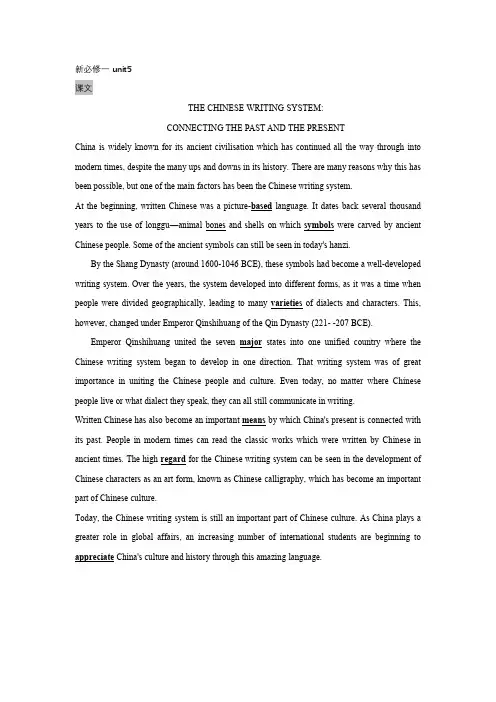
新必修一unit5课文THE CHINESE WRITING SYSTEM:CONNECTING THE PAST AND THE PRESENTChina is widely known for its ancient civilisation which has continued all the way through into modern times,despite the many ups and downs in its history.There are many reasons why this has been possible,but one of the main factors has been the Chinese writing system.At the beginning,written Chinese was a picture-based language.It dates back several thousand years to the use of longgu—animal bones and shells on which symbols were carved by ancient Chinese people.Some of the ancient symbols can still be seen in today's hanzi.By the Shang Dynasty(around1600-1046BCE),these symbols had become a well-developed writing system.Over the years,the system developed into different forms,as it was a time when people were divided geographically,leading to many varieties of dialects and characters.This, however,changed under Emperor Qinshihuang of the Qin Dynasty(221--207BCE).Emperor Qinshihuang united the seven major states into one unified country where the Chinese writing system began to develop in one direction.That writing system was of great importance in uniting the Chinese people and culture.Even today,no matter where Chinese people live or what dialect they speak,they can all still communicate in writing.Written Chinese has also become an important means by which China's present is connected with its past.People in modern times can read the classic works which were written by Chinese in ancient times.The high regard for the Chinese writing system can be seen in the development of Chinese characters as an art form,known as Chinese calligraphy,which has become an important part of Chinese culture.Today,the Chinese writing system is still an important part of Chinese culture.As China plays a greater role in global affairs,an increasing number of international students are beginning to appreciate China's culture and history through this amazing language.中文书写系统:连接过去和现在中国以其一直延续到现代的古老文明而闻名,尽管在它的历史上有许多起起落落。
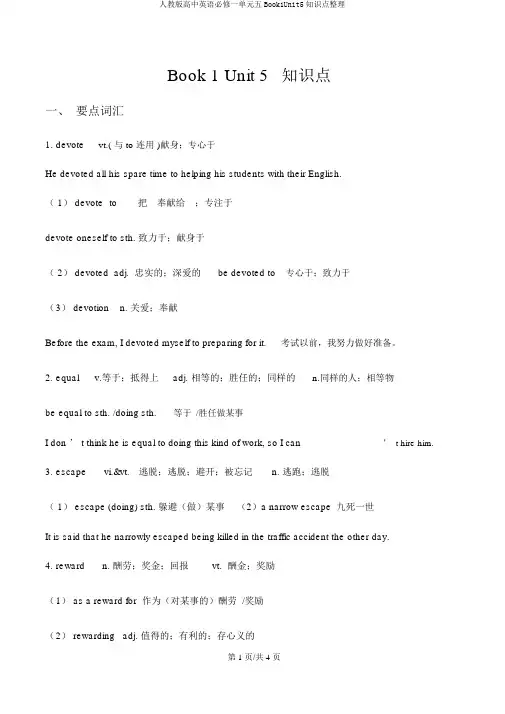
Book 1 Unit 5知识点一、要点词汇1. devote vt.( 与 to 连用 )献身;专心于He devoted all his spare time to helping his students with their English.( 1) devote to把奉献给;专注于devote oneself to sth. 致力于;献身于( 2) devoted adj. 忠实的;深爱的be devoted to专心于;致力于(3) devotion n. 关爱;奉献Before the exam, I devoted myself to preparing for it.考试以前,我努力做好准备。
2. equal v.等于;抵得上adj. 相等的;胜任的;同样的n.同样的人;相等物be equal to sth. /doing sth.等于/胜任做某事I don ’ t think he is equal to doing this kind of work, so I can’ t hire him.3. escape vi.&vt.逃脱;逃脱;避开;被忘记n. 逃跑;逃脱( 1) escape (doing) sth. 躲避(做)某事(2)a narrow escape九死一世It is said that he narrowly escaped being killed in the traffic accident the other day.4. reward n. 酬劳;奖金;回报vt. 酬金;奖励(1) as a reward for 作为(对某事的)酬劳 /奖励(2) rewarding adj. 值得的;有利的;存心义的You mentioned that you could teach English as a reward, which is exactly what I want. When asked for his views about his teaching job, Philip said he found it very interestingand rewarding.5.in trouble 有麻烦;处于困难中;在危险、受罚、难过、忧愁等的处境中take the trouble to do sth.不辞劳苦做某事have trouble (in) doing sth./with sth.做某事有困难一句多译:无论什么时候学习碰到困难,请立刻找我们帮忙。
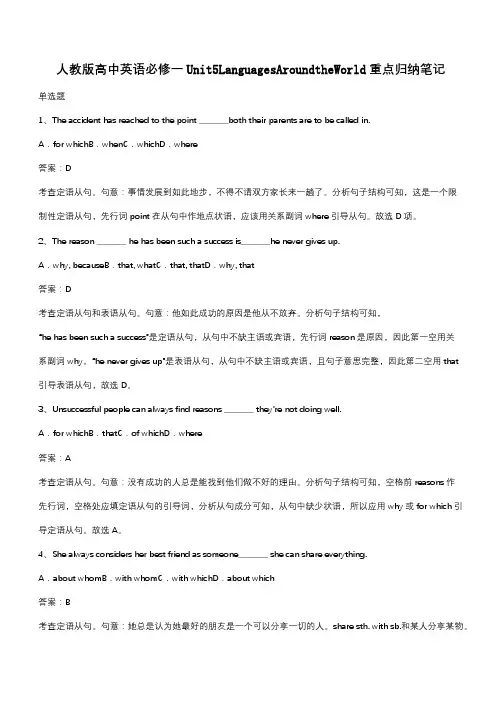
人教版高中英语必修一Unit5LanguagesAroundtheWorld重点归纳笔记单选题1、The accident has reached to the point ________both their parents are to be called in.A.for whichB.whenC.whichD.where答案:D考查定语从句。
句意:事情发展到如此地步,不得不请双方家长来一趟了。
分析句子结构可知,这是一个限制性定语从句,先行词point在从句中作地点状语,应该用关系副词where引导从句。
故选D项。
2、The reason ________ he has been such a success is________he never gives up.A.why, becauseB.that, whatC.that, thatD.why, that答案:D考查定语从句和表语从句。
句意:他如此成功的原因是他从不放弃。
分析句子结构可知,“he has been such a success”是定语从句,从句中不缺主语或宾语,先行词reason是原因,因此第一空用关系副词why,“he never gives up”是表语从句,从句中不缺主语或宾语,且句子意思完整,因此第二空用that引导表语从句,故选D。
3、Unsuccessful people can always find reasons ________ they’re not doing well.A.for whichB.thatC.of whichD.where答案:A考查定语从句。
句意:没有成功的人总是能找到他们做不好的理由。
分析句子结构可知,空格前reasons作先行词,空格处应填定语从句的引导词,分析从句成分可知,从句中缺少状语,所以应用why或for which引导定语从句。
故选A。
4、She always considers her best friend as someone________ she can share everything.A.about whomB.with whomC.with whichD.about which答案:B考查定语从句。
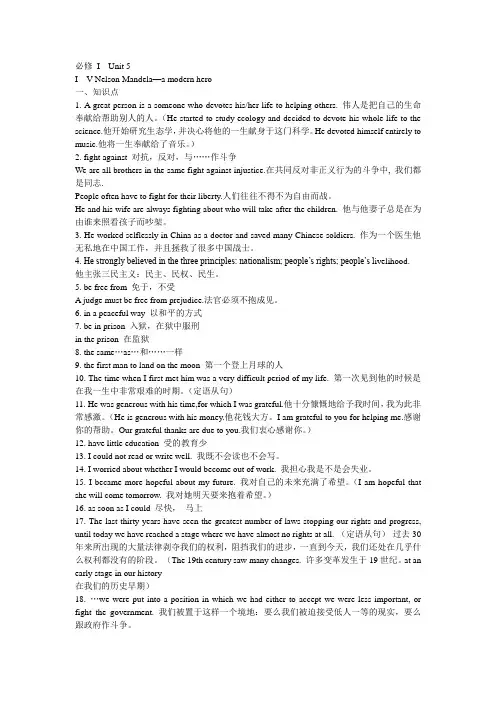
必修I---Unit 5I---V Nelson Mandela—a modern hero一、知识点1. A great person is a someone who devotes his/her life to helping others. 伟人是把自己的生命奉献给帮助别人的人。
(He started to study ecology and decided to devote his whole life to the science.他开始研究生态学,并决心将他的一生献身于这门科学。
He devoted himself entirely to music.他将一生奉献给了音乐。
)2. fight against 对抗,反对,与……作斗争We are all brothers in the same fight against injustice.在共同反对非正义行为的斗争中, 我们都是同志.People often have to fight for their liberty.人们往往不得不为自由而战。
He and his wife are always fighting about who will take after the children. 他与他妻子总是在为由谁来照看孩子而吵架。
3. He worked selflessly in China as a doctor and saved many Chinese soldiers. 作为一个医生他无私地在中国工作,并且拯救了很多中国战士。
4. He strongly believed in the three principles: nationalism; people’s rights; people’s l ivelihood.他主张三民主义:民主、民权、民生。
5. be free from 免于,不受A judge must be free from prejudice.法官必须不抱成见。
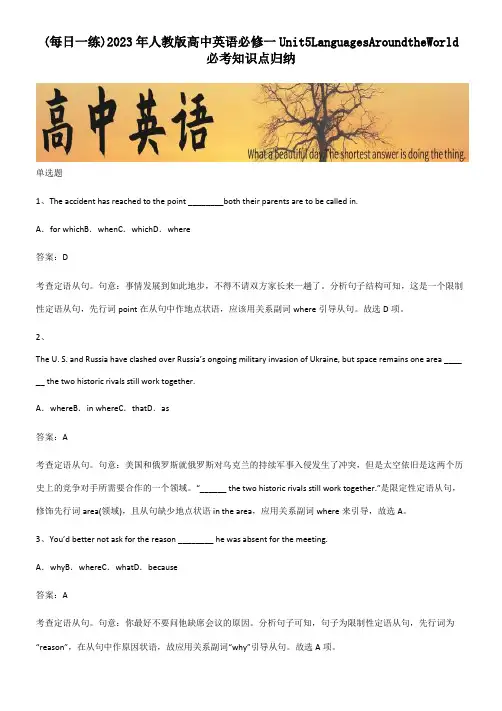
(每日一练)2023年人教版高中英语必修一Unit5LanguagesAroundtheWorld必考知识点归纳单选题1、The accident has reached to the point ________both their parents are to be called in.A.for whichB.whenC.whichD.where答案:D考查定语从句。
句意:事情发展到如此地步,不得不请双方家长来一趟了。
分析句子结构可知,这是一个限制性定语从句,先行词point在从句中作地点状语,应该用关系副词where引导从句。
故选D项。
2、The U. S. and Russia have clashed over Russia’s ongoing military invasion of Ukraine, but space remains one area ____ __ the two historic rivals still work together.A.whereB.in whereC.thatD.as答案:A考查定语从句。
句意:美国和俄罗斯就俄罗斯对乌克兰的持续军事入侵发生了冲突,但是太空依旧是这两个历史上的竞争对手所需要合作的一个领域。
“______ the two historic rivals still work together.”是限定性定语从句,修饰先行词area(领域),且从句缺少地点状语in the area,应用关系副词where来引导,故选A。
3、You’d better not ask for the reason ________ he was absent for the meeting. A.whyB.whereC.whatD.because答案:A考查定语从句。
句意:你最好不要问他缺席会议的原因。
分析句子可知,句子为限制性定语从句,先行词为4、This is the place_____ John was born?A.whichB.whereC.whenD.that答案:B考查定语从句。
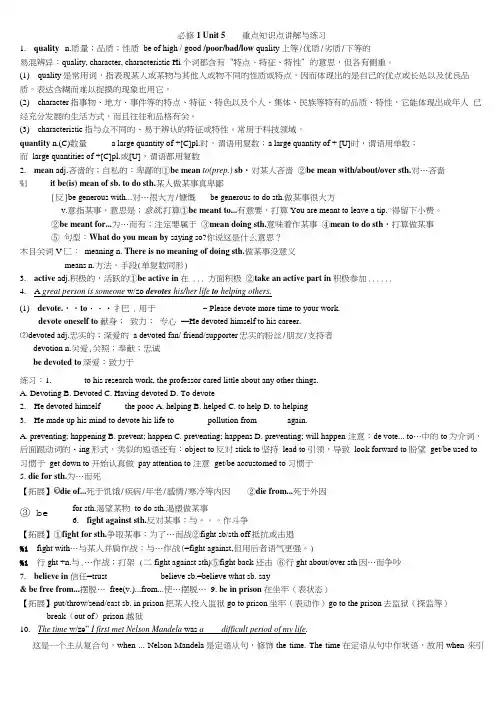
③ be dying] 必修1 Unit 5 重点知识点讲解与练习1.quality n.质量;品质;性质be of high / good /poor/bad/low quality 上等/优质/劣质/下等的易混辨异:quality, character, characteristic Hi个词都含有“特点、特征、特性”的意思,但各有侧重。
(1)quality是常用词,指表现某人或某物与其他人或物不同的性质或特点,因而体现出的是自己的优点或长处以及优良品质。
表达含糊而难以捉摸的现象也用它。
(2)character指事物、地方、事件等的特点、特征、特色以及个人、集体、民族等特有的品质、特性,它能体现出成年人已经充分发展的生活方式,而且往往和品格有关。
(3)characteristic指与众不同的、易于辨认的特征或特性。
常用于科技领域。
quantity n.(C)数量 a large quantity of +[C]pl.时,谓语用复数;a large quantity of + [U]时,谓语用单数;而large quantities of +[C]pl.或[U],谓语都用复数2.mean adj.吝啬的;自私的;卑鄙的①be mean to(prep.) sb・对某人吝啬②be mean with/about/over sth.对…吝啬%1it be(is) mean of sb. to do sth.某人做某事真卑鄙[反]be generous with...对…很大方/慷慨be generous to do sth.做某事很大方v.意指某事,意思是;意欲,打算①be meant to...有意要,打算You are meant to leave a tip.^得留下小费。
②be meant for...为…而有;注定要属于③mean doing sth.意味着作某事④mean to do sth・打算做某事⑤ 句型:What do you mean by saying so?你说这是什么意思?木目关词V匚:meaning n. There is no meaning of doing sth.做某事没意义means n.方法,手段(单复数同形)3.active adj.积极的,活跃的①be active in在 ... 方面积极②take an active part in积极参加......4. A great person is someone w/zo devotes his/her life to helping others.(1)devote.・・to・・•扌巴. 用于~ Please devote more time to your work.devote oneself to 献身;致力;专心—He devoted himself to his career.⑵devoted adj.忠实的;深爱的 a devoted fan/ friend/supporter忠实的粉丝/朋友/支持者devotion n.关爱,关照;奉献;忠诚be devoted to深爱;致力于练习:1. ______ to his research work, the professor cared little about any other things.A. DevotingB. DevotedC. Having devotedD. To devote2.He devoted himself _____ the pooc A. helping B. helped C. to help D. to helping3.He made up his mind to devote his life to _______ pollution from ______ again.A. preventing; happeningB. prevent; happenC. preventing; happensD. preventing; will happen 注意:de vote... to…中的to为介词,后面跟动词的・ing形式,类似的短语还有:object to反对stick to坚持lead to 引领,导致look forward to 盼望get/be used to 习惯于get down to 开始认真做pay attention to 注意get/be accustomed to 习惯于5. die for sth.为…而死【拓展】©die of...死于饥饿/疾病/年老/感情/寒冷等内因②die from...死于外因for sth.渴望某物to do sth.渴塑做某事6.fight against sth.反对某事;与。
必修一Unit 5课本知识点复习一. 词汇1. quality n. 质量--quantity n.数量2. mean adj. 吝啬的;卑鄙的-- mean v. 意味着--meaning n. 含义3. act v. 行动;表扬-- active adj. 有活力的--action n. 行动;活动--activity n. 活动4. self n. 自我-- selfish adj. 自私的--selfless adj. 无私的;忘我地--selflessly adv. 无私地;忘我地5. devote v.献身;专心于-- devoted adj. 忠实的;深爱的-- devotion n.关爱;关照6. peace n. 和平-- peaceful adj. 和平的7. law n. 法律-- lawyer n. 律师8. guide v. 指导;引路n. 向导-- guidance n. 指导;领导9. hope v.希望-- hopeful adj. 有希望的;怀有希望的10. young adj. 年轻的-- youth n. 青年11. violent adj. 暴力的,剧烈的-- violence n. 暴力;暴行12. equal adj. 相等的,平等的;胜任的vt. 等于-- equally adv. 相等地;同等地--equality n. 平等13. will n. 意愿;意志力-- willing adj. 乐意的;自愿的14. fair adj. 公平的;合理的-- unfair adj.不公平的15. educate v. 教育-- educated adj. 受过教育的;有教养的16. cruel adj. 残酷的,残忍的-- cruelty n. 残忍17. generous adj. 慷慨的;仁慈的-- generosity n.慷慨, 大方18. power n. 力量--powerful adj. 强大的二. 词语短语积累1. (1) mean adj. 吝啬的;卑鄙的be mean to sb. 对某人刻薄be mean with sth. 对某物吝啬e.g.The rich boss who is mean to his workers is mean with money. 那位对工人很刻薄的富有老板对钱很吝啬。
(2) mean vt. 意味着;打算mean to do sth. 打算做某事;有意做某事mean doing sth. 意味着做某事e.g.I'm sorry, but I didn't mean to upset your plan. 对不起;但我并非有意打乱你的计划。
【拓展】means v. 手段;方法(单复数同形)2. active adj. 积极的;活跃的be active in... 在...方面积极take an active part in 积极参加3. devote:devote...to... 把...奉献于...;把...专注于devote oneself to 献身于....;致力于....be devoted to... 专心于...,奉献于...e.g.He devoted himself entirely to music. 他全力倾注于音乐。
I could only devote two hours a day to working on the project. 我一天只能在这个项目上花两个小时。
4. fight against “与...作斗争;与...作战”fight with “同...并肩作战”fight for “为...而斗争,努力争取”【课堂练习】单句语法填空1. Mr. Reed made up his mind to devote all his savings to ________(set) up some schools for poor areas.2. ___________(devote) to his scientific work, he has no time to care for his family affairs.3. The time and effort he has devoted during the past few years ___________(plant) trees in that remote area is now considered to be of great value.4. --You should have thanked her before you left.--I meant _________(do) so, but when I was leaving I couldn't find her anywhere.5. He is ________ (act)in organizing students' meeting.6. In World War Two, the Americans fought _________ the Britain and French _________ the Germans. 二战中美国联合英、法两国对德作战。
1. setting2. Devoted3. to planting4. to do.5. active.6. with; against5. in prison 坐牢put sb. in prison 把某人关进监狱in the prison 在监狱中e.g.He has been in prison for five years.There are two libraries in the prison.6. out of work 失业He has been out of work for six months.拓展:out of date 过时out of breath 上气不接下气out of control 失去控制out of order 出故障7. vote vt./vi. 表决,投票,选出vote for/against 投票赞成/反对vote on sth. 就某事投票表决He voted for the candidate. 他投了那位候选人的票Now we will vote on this question. 现在我们将就这个问题进行投票8. attack vt. 进攻, 攻击n. 攻击under attack 受到攻击The judge said that it was not legal to attack other people with violence. 法官说用暴力攻击别人是不合法的。
What will you do if you are under attack? 你受到袭击时会怎么做呢?【课堂练习】完成句子1.In the past, the black people in the USA ______________________(没有选举的权利).2.H e didn’t obey the rules of the company, so now he is ___________________(失业).3.It is cloudy. It seems as if our city is _______________(受…袭击) of a thunder storm.1.have no right to vote2.out of work3.under attack9. as a matter of fact = in fact 实际上10. blow up 爆炸,炸毁11. equal adj. 平等的,同等的;能胜任的vt. 能应付的,能胜任的;比得上n.相等的人be equal to…与…相等;能胜任…A equalB in… A在….方面比得上Be.g.Bill is equal to the challenge. 比尔有能力应付这一挑战。
No one equals him in strength. 论力量,无人能和他相比。
He is a player without equal. 他是个无与伦比的运动员。
12. be in trouble 陷入麻烦;陷入困境have trouble(in)doing sth. 做某事有困难。
13. turn to 求助;翻到(书的某页)turn on 打开(电视,电灯)turn up 调高;出现turn down 调低;拒绝turn out 结果是;证明是【课堂练习】单句语法填空1.—Why does Jane always ask you for help?—There is no one else she can turn_______, is there?2.Tom had to turn ________ the invitation to the party last weekend because he was too busy.3.I am afraid your request for a pay rise was turned __________ again.4.Don’t worry. I’m sure your missing glasses will turn ___________sooner or later.1.to2. down3. down4.up14. agree with 同意agree with sb. /sth. 同意某人/某事agree with what sb. says/said 同意某人所说的话agree on 在…方面达成一致意见agree to do sth. 同意做某事I agree with her idea about the problem. 我同意她关于这个问题的观点。
I don’t agree with what you said. 我不同意你说的。
They agreed on a date and a place to meet. 他们就见面的日期和地点达成了一致意见。
I agreed to spend the holiday in the south. 我同意在南方度假。
15. release vt. 释放release sb.from…从…中释放某人The guy was released from prison last month.那个家伙上个月被释放出狱了。